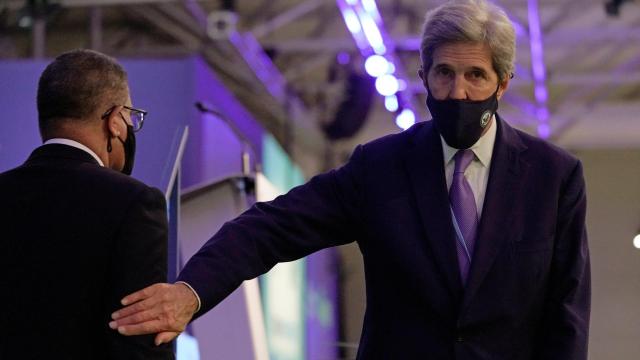GLASGOW, SCOTLAND — Every Democrat in Glasgow for the United Nations climate meeting, from John Kerry to Joe Biden to AOC to Barack Obama, has shared one message. After four long years of the Trump administration acting as a wrecking ball, these politicians have said, the U.S. is back in the climate process and ready to lead the world to success. There’s just one problem: It’s bullshit.
A casual American Democratic voter probably thinks of the Obama administration as the gold standard when it comes to UN climate leadership. That’s not an accident: Over the past four years, the Democrats have made the Paris Agreement — and, by extension, the image of Barack Obama as an international climate champion — a core part of their image. Joe Biden campaigned hard on reentering the Paris Agreement. Trump’s almost laughably evil climate and environmental record did a great job of further bolstering his predecessor’s image.
Accordingly, the message that the U.S. “back” in Glasgow is meant to be a positive bit of cheerleading to get everyone excited that the adults are back in the room and ready to help out. It’s even a pretty literal interpretation when it comes to personnel. Much of the U.S. negotiating team on the ground in Glasgow, notably Kerry himself, were part of the Obama-era crew.
But it’s important to remember that for many parties on the international stage, especially those suffering the most from climate impacts, Obama’s administration was not a saint. It was a bully. The U.S. has always acted in its own short-term economic self-interest when it comes to international climate policy — even those interests that go against lowering emissions or helping poorer countries. While the Paris Agreement was a great success in terms of getting everyone to the table, the U.S. drove a very hard bargain against a lot of what countries actually needed to survive climate change in order to make it happen.
“The game for the US during Obama, and again now under Biden, is to look like a climate leader while not doing anything that would actually commit us to do anything,” Brandon Wu, the Director of Policy and Campaigns at ActionAid USA, told me over email. What this means, Wu explained, is framing incredibly tiny concessions as big wins and “negotiating in the spirit of compromise” — while resisting delivering on what’s actually needed.
“This is very similar to how the US operated under Obama,” he said. “They constantly trumpeted ‘US climate leadership’ while never pledging a fair share of emissions reductions or budging on the things of most importance to developing countries – finance and loss & damage.”
Looking at the way the U.S. is operating in Glasgow, it’s easy to see this pattern playing out. Kerry lambasted fossil fuel subsidies as “the definition of insanity” in Glasgow last week. But the U.S. is the largest oil and gas producer in the world, and the fact that Kerry’s team reportedly pushed for language to be included that allowed for continued fossil fuel subsidies makes sense in this light. The U.S. is also the world’s largest historic emitter, responsible for much of the destruction that developing countries around the world are seeing firsthand — and paying for. Negotiators from small island states have called out the U.S. specifically as pushing hard against fulfilling promises to deliver on real financial aid at this meeting. That’s essentially a refusal to take responsibility for decades of economic growth tied to fossil fuels that made it the richest nation in the world.
Glasgow is the “same old shit from Kerry and the Obama-era gang,” Nathan Thanki of the Global Campaign to Demand Climate Justice told me over Twitter DM. “The US’ challenge is how to a) give the impression of climate leadership while b) advancing US oil and gas interests.”
On that front, the country notably signed onto a pledge to reduce methane emissions (with no penalty for failing to do so) while ignoring the opportunity to join a group of other nations who have created an alliance of governments with plans to end oil and gas production. It also avoided a pledge to transition to electric vehicles even as the Biden administration has talked up its commitment to them at home.
Diplomacy is tricky, hard choices need to be made, and no country is perfect. But Americans should be realistic about the job our diplomats are doing abroad. We should understand that when Kerry and his team say the U.S. is “back” at the UN, other countries might be grateful to have the second-largest current emitter at the table — and also a little afraid of what the bully in the room is going to do next.
